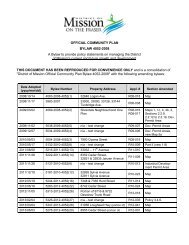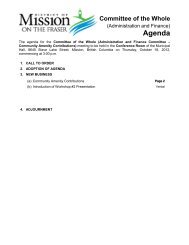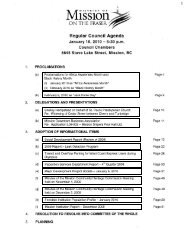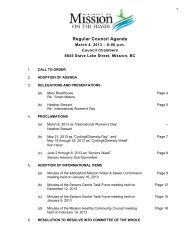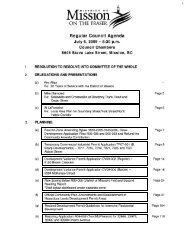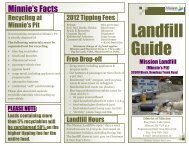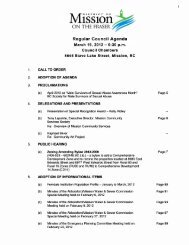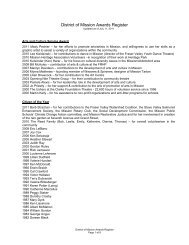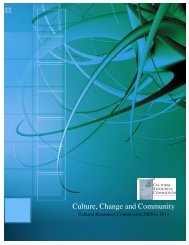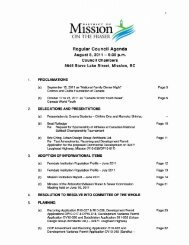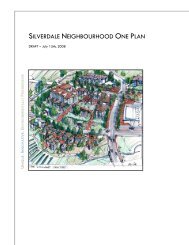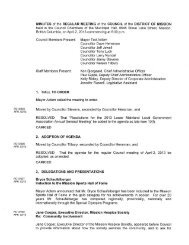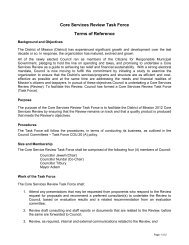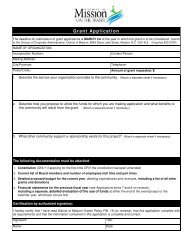June 15, 2009 - District of Mission
June 15, 2009 - District of Mission
June 15, 2009 - District of Mission
Create successful ePaper yourself
Turn your PDF publications into a flip-book with our unique Google optimized e-Paper software.
198<br />
<strong>District</strong> <strong>of</strong> <strong>Mission</strong> — 2008 Audit Results and Communication<br />
Page 19<br />
• Staff Salaries • Computer audit testing<br />
• Analytical review <strong>of</strong> staff and salary levels<br />
• Systems testing and tests <strong>of</strong> controls<br />
Materiality<br />
Materiality in an audit is used as a guide for planning the nature and extent <strong>of</strong> audit procedures and for<br />
assessing the sufficiency <strong>of</strong> audit evidence gathered. It is also used in evaluating the misstatements found and<br />
determining the appropriate audit opinion to express.<br />
Since the determination <strong>of</strong> materiality is a matter <strong>of</strong> pr<strong>of</strong>essional judgment, it is primarily dependent on our<br />
evaluation <strong>of</strong> the relative importance <strong>of</strong> accuracy in the financial statements to the various users <strong>of</strong> those<br />
statements. We have identified taxpayers, Council, the Ministry and (indirectly) the Municipal Finance<br />
Authority as the most important users <strong>of</strong> the <strong>District</strong>'s financial statements. We describe the MFA as having<br />
an "indirect" interest because while they do not generally review the financial statements <strong>of</strong> each municipality<br />
in, detail, the combined financial status <strong>of</strong> British Columbia municipalities is <strong>of</strong> importance to them and they<br />
would be particularly concerned with any qualified or denied audit opinions should they occur.<br />
Canadian generally accepted auditing standards require the use <strong>of</strong> both quantitative and qualitative factors in<br />
determining materiality. For the audit <strong>of</strong> the <strong>District</strong> <strong>of</strong> <strong>Mission</strong> for the year ended December 31, 2008, we<br />
have concluded that a planning materiality level <strong>of</strong> $800,000 based on approximately 2% <strong>of</strong> net combined<br />
expenditures, and adjusted by qualitative factors is appropriate for the purposes <strong>of</strong> the audit.<br />
Audit Team<br />
In order to ensure effective communication between the Council and BDO Dunwoody LLP, we briefly outline<br />
below the key members <strong>of</strong> our audit team and the role they will play:<br />
• Bill Cox, CA, Engagement Partner — overall engagement management<br />
• Patrick Chan, CA, Audit Manager — fieldwork management<br />
• Jessica Jang, CA finalist — audit senior<br />
Timing <strong>of</strong> the Audit<br />
We have tentatively set the following schedule for the conduct <strong>of</strong> the audit:<br />
• Interim audit fieldwork • December <strong>15</strong> — 19, 2008<br />
• Year-end audit fieldwork • April 6 — 9, 2008<br />
• Review <strong>of</strong> draft financial statements • TBA<br />
with Council<br />
• Council post-completion meeting • TBA<br />
• Finalization <strong>of</strong> financial statements • TBA<br />
Communication <strong>of</strong> Results<br />
At the completion <strong>of</strong> our audit, or earlier if considered necessary, we will communicate to you matters arising<br />
from the financial statement audit. Our communication will include the following:



